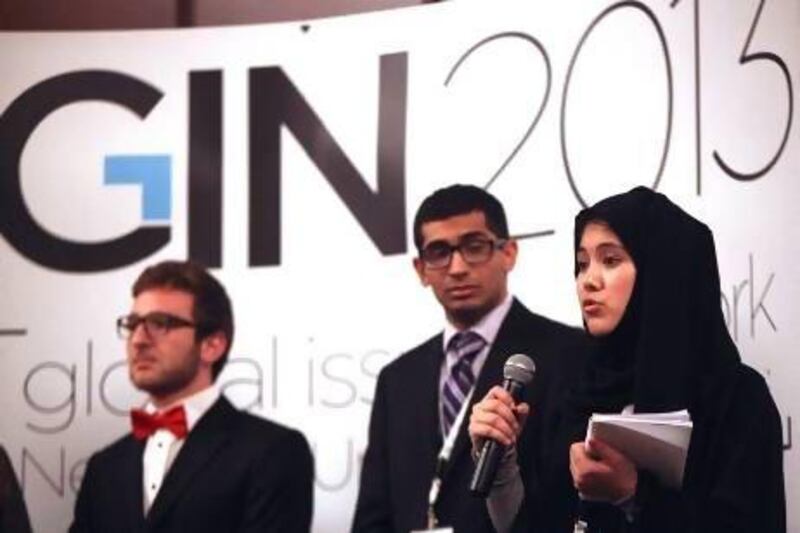ABU DHABI // Students from around the world came together in the capital at the weekend to discuss some of the emirate's major challenges.
The Global Issues Network was held for the first time in Abu Dhabi, bringing together 50 high school and university students from countries including Spain, the United States and Bahrain.
Topics covered included health, education, energy, technology and waste management.
Unlike a Model UN, there was no set agenda - instead, students were given broad topics to address. The only challenge was to make their solutions Abu Dhabi-specific.
Groups of students presented their findings and made suggestions to industry and government experts from at home and abroad.
Jean Drummond, president of HCD International, a US-based strategic consulting firm committed to improving the quality of health care and reducing cost, was impressed by the presentations.
Yesterday, she heard a group's work on the link between diabetes and depression and how to raise awareness and increase the quality of care. Sufferers of diabetes are 30 per cent more likely to suffer from depression.
"I like how the presenter said he wanted to create a generation that is sensitive to mental health," Ms Drummond said. "Health care is still not totally embracing mental-health issues."
Some built on proven projects, such as focusing on methods of removing dust from solar panels, which are already used by the US space agency, Nasa. "Building on methods already proven is also great ... with all our solutions we don't have to go back to zero," she said.
Rustein Merriweather and his twin brother, Travis, travelled from Texas for the event. Their presentation focused on the use of music in education, aimed at the Abu Dhabi Education Council (Adec) and its focus on "increasing creativity and parental involvement" in schools.
Rustein quoted studies that have shown the positive effects of music in learning, from increased brain capacity to improved exam scores.
They proposed a one-year trial of various extra-curricular activity in schools, which they predicted would see a "10 per cent increase in standardised exam scores" as well as "structural brain growth" that could be proven by MRI scanning.
The projects presented will be considered by local government officials. Representatives from Adec and the Khalifa Fund were present yesterday.
"The students are getting the chance to be heard by our partners in government," said Ben Jance, executive director of the conference and a student at New York University Abu Dhabi (NYUAD), which hosted the conference. "We can't force anyone to do anything but we hope this sparks a collaboration between the students and government on an influential level."
Osama Salman, 19, from the UK, another student at NYUAD, was one of the organisers of the event.
"We're the future generation and future world leaders, so if we can have a say and influence government officials, and these people think our ideas are good and may work with us towards implementation, that would be great."
Mr Jance added: "It's not as much about influencing government officials as working with them."
Amal Al Junaibi, a 21-year-old business student from Sharjah Women's College, was one of 10 Emirati students at the event.
"It's interesting to interact with students from different countries and colleges," she said. "It's about building your confidence as you work on your teamwork skills and communication skills, so this has really helped me develop this."






